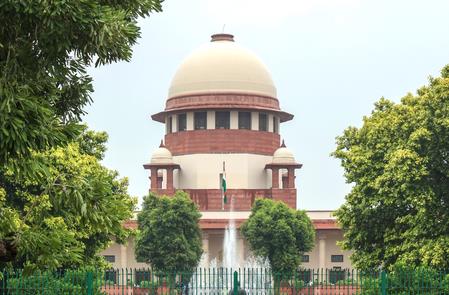
SC Allows In-Service Judges In Direct District Judge Recruitment
A Constitution Bench led by Chief Justice of India (CJI) B.R. Gavai issued a slew of directions, overturning previous Apex Court judgements which excluded in-service judges from competing against advocates for district judge posts.
"Judicial Officers who have already completed seven years in Bar before they were recruited in the subordinate judicial service would be entitled for being appointed as a District Judge/Additional District Judge in the selection process for direct recruitment," held the five-judge Bench, also comprising Justices MM Sundresh, Aravind Kumar, SC Sharma and K Vinod Chandran.
The Apex Court ruled that eligibility must be determined at the time of application and not appointment.
Allowing a new "combined experience" standard, it said, "Though there is no eligibility prescribed under Article 233(2) for a person already in judicial service of the Union or of the State for being appointed as District Judge, in order to provide a level playing field, we direct that a candidate applying as an in-service candidate should have seven years' combined experience as a Judicial Officer and an advocate".
"A person who has been or who is in judicial service and has a combined experience of seven years or more as an advocate or a Judicial Officer would be eligible for being considered and appointed as a District Judge/Additional District Judge under Article 233 of the Constitution," it added.
Ensuring a "level playing field" between advocates and serving judges, the Constitution Bench directed that the minimum age for consideration and appointment as a district judge or additional district judge would be 35 years, as of the date of application, for both advocates and judicial officers.
The Supreme Court directed all state governments to frame uniform recruitment rules in consultation with their High Courts in line with its latest judgement. The Constitution Bench maintained the 50:25:25 quota for district judges - 50 per cent by promotion, 25 per cent by limited departmental exam, and 25 per cent by direct recruitment from the Bar.
It clarified that its ruling would apply prospectively and said, "What we have held in this judgment will be applicable only from the date of this judgment and in no case any selection process completed or appointment made prior to this judgment would be affected, except in cases wherein any interim order(s) were passed by the High Courts or this Court."

Legal Disclaimer:
MENAFN provides the
information “as is” without warranty of any kind. We do not accept
any responsibility or liability for the accuracy, content, images,
videos, licenses, completeness, legality, or reliability of the information
contained in this article. If you have any complaints or copyright
issues related to this article, kindly contact the provider above.

















Comments
No comment